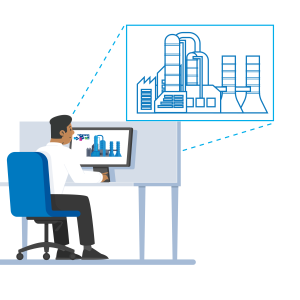The rapid shift to more sustainable industrial operations has dramatically impacted the hydrocarbon processing industry. It seems like almost overnight, operations teams are looking at entirely new processes focused on manufacturing new, greener alternative products such as hydrogen. In fact, moving to hydrogen manufacturing makes a lot of sense for many companies, as much of the infrastructure they need is likely already in place.
But a more rapid transition is not necessarily a simpler one, Emerson’s Nathan Pettus explains in his recent article in Hydrocarbon Processing. Hydrogen plants are complex, and operating them successfully and, just as importantly, sustainably, requires technology to provide comprehensive vision and decision support, especially among lean teams.
Without control, chaos
It all starts, Nathan explains, with a powerful, modern, fit-for-purpose distributed control system (DCS).
“ A powerful DCS that is connected with homogenous smart devices and Internet of Things (IoT) technologies provides assistance by bringing complex, variable data into one place—thus increasing operator efficiency. ”
That efficiency is critical to helping small teams navigate the wide variety of equipment and processes across a hydrogen plant. Teams will need rapid access to information in as few clicks as possible, and the modern HMI tools provided by solutions such as DeltaV™ Live can help even the smallest teams maintain consistent operational awareness to provide safe, efficient operations..
Lock in best practices
Another strategy plants use to ensure the best operations across their hydrogen processes is to lock best practices in place using advanced process control (APC). With APC, teams no longer need to worry that when a highly experienced operator retires or takes a new position, all their knowledge leaves with them. Using APC, the teams build that knowledge into the control system logic so it is executed the same way, every single time. In addition, Nathan explains,
“ Because the process stages and thresholds are built into software logic, teams can often safely run their processes much closer to constraint limits, thereby increasing efficiency and profitability across the operation. ”
In essence, the rapid multivariate processing built into APC can monitor far more constraints, far faster than a human operator, giving them the ability to operate at peak efficiency without increasing the risk that a process aberration will go unnoticed.
Staying ahead of the game
Hydrogen manufacturing teams are also leaning heavily into prediction, both via asset monitoring solutions and using simulation technology. With asset monitoring, operators and maintenance personnel can quickly and easily see when any asset in the plant is starting to fail, and can intervene well before those aberrations become production outages due to equipment failure. With the wide variety of equipment necessary to maintain continuous hydrogen production, a solution like AMS Device Manager can help even the leanest teams keep a finger on plant health, and can also help them decide which actions to take when an asset begins to fail, making them far more effective in the field.

Simulation tools, on the other hand, help teams create digital replicas of the entire plant that can be used for a wide array of purposes. First and foremost, digital twin simulations can be used to simplify and streamline capital projects,
“ Teams can test equipment to ensure that it meets specifications, check processes to identify flaws and bottlenecks, and develop new advanced control technologies—all in a safe environment and long before equipment arrives onsite. ”
And in the most advanced scenarios, operations teams can even test process changes on digital twin technologies to effectively “predict the future,” running the simulation at high speed to see exactly how any change will cascade down the line to help make the best process decisions. Nathan explores the strategies and technologies hydrogen manufacturers are using in greater depth in his article at Hydrocarbon Processing. Be sure to read the article in its entirety to learn more about how modern automation technologies can help hydrogen producers reduce startup time, increase production, and improve efficiency, all while simultaneously meeting their net zero targets.

